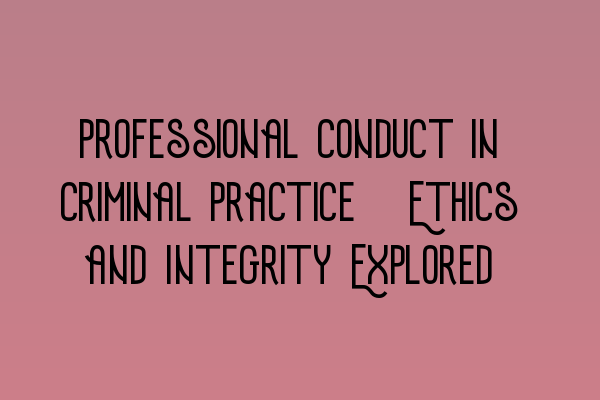Professional Conduct in Criminal Practice: Ethics and Integrity Explored
As criminal law solicitors, it is essential that we uphold the highest standards of ethics and integrity in our professional conduct. The nature of our work places us in a position of trust, and it is crucial that we maintain the confidence of our clients, the courts, and the wider public.
One key aspect of professional conduct in criminal practice is adhering to the Solicitors Regulation Authority (SRA) Code of Conduct. This code provides guidance on various ethical issues, including client confidentiality, conflicts of interest, and the duty to act in the best interests of clients.
Client confidentiality is of utmost importance in criminal practice. Clients must feel confident that anything discussed during consultations will remain confidential. Breaching client confidentiality not only undermines the trust between solicitor and client but also damages the reputation of the legal profession as a whole.
Conflicts of interest can arise in criminal practice, particularly in cases where multiple defendants are involved or when a solicitor has previously represented a witness or a co-defendant. It is essential to identify and manage these conflicts appropriately, in order to ensure the integrity of the legal process.
Another crucial aspect of professional conduct is the duty to act in the best interests of clients. This means providing them with honest and accurate advice, even if it may not be what they want to hear. It also means maintaining their rights and ensuring fair treatment throughout the legal proceedings.
The Importance of Ethics and Integrity
Integrity and ethics are essential elements in building a successful and respected criminal practice. Clients are more likely to trust solicitors who demonstrate a commitment to ethical behavior and uphold high professional standards.
Furthermore, courts rely on solicitors to present their cases with honesty and integrity. If a solicitor is found to have acted unethically, it can have serious consequences for both the solicitor and their client. This can include disciplinary action, a damaged reputation, and even the dismissal of a case.
It is also important to note that ethical conduct extends beyond the courtroom. Building a reputation for ethical behavior can lead to referrals and repeat business, as satisfied clients are more likely to recommend your services to others.
Continuing Professional Development and Training
Keeping up-to-date with changes in the legal profession and maintaining a comprehensive understanding of relevant laws and regulations is crucial for ethical practice. The Solicitors Qualifying Examination (SQE) provides an opportunity for solicitors to demonstrate their knowledge and skills in criminal law and practice.
SQE preparation courses, such as SQE 1 Preparation Courses and SQE 2 Preparation Courses, can help solicitors enhance their knowledge and ensure they are well-prepared for the challenges of criminal practice.
For solicitors looking to test their skills and knowledge, SQE 1 practice exams and mocks, like those available at SQE 1 Practice Exam Questions and SQE 1 Practice Mocks FLK1 FLK2, provide a valuable opportunity for self-assessment.
Conclusion
Professional conduct in criminal practice is based on ethics and integrity. Upholding these values is not only a legal requirement imposed by the SRA but also a moral obligation to both clients and the legal profession.
By adhering to the SRA Code of Conduct, continuing professional development through SQE preparation courses, and embracing ethical behavior in all aspects of practice, solicitors can maintain the highest standards and build a successful criminal law career.
For more information on the SQE and exam dates, visit SRA SQE Exam Dates.
